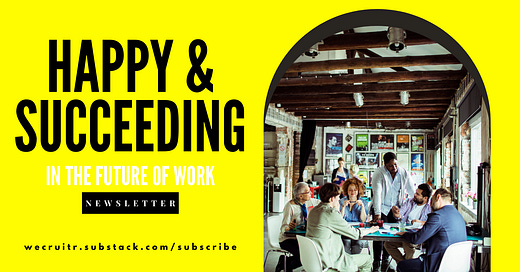CEOs Of Apple, Goldman Sachs, JPMorgan And Other Top Companies Are Taking Pay Cuts
Rank-and-file workers primarily bear the brunt of downsizing when their companies aren’t doing well. The people who most need to hold onto their salaries are vulnerable to job losses, while the highly compensated CEOs usually get to keep their positions. As a white-collar recession emerged, as reflected by the layoffs announced by some of the world’s largest and most profitable companies, like Amazon, Microsoft, Meta, Google and Goldman Sachs, the CEOs were left untouched.
In Between Jobs? Be Prepared For Well-Meaning, Bad Career Advice
If you’ve lost your job in the recent white-collar recession, you’ll likely receive career advice from your family, friends, co-workers and online gurus. While some of the guidance means well, be cautious and take it with a grain of salt. It’s harmful to offer sweeping generalizations as every job market is different. As the labor market was hot, you would have benefited from being told to switch jobs during the Great Resignation. Today, it would be inadvisable to capriciously rage quit, as the market is saturated with job seekers.
How To Overcome Interview Stress And Anxiety
One of the best ways to reduce interview stress is to conduct homework on the company, read over the job description several times, make sure you have the skills and experience relative to the requests of the job advertisement and practice role-playing the interview. If you lack a few of the requisites, think of ways to show that you can quickly learn the skills. The more you study the company, its people, management, online reputation, products and services and other factors, the more you feel comfortable and confident that you are in the right place at the right time.
You Must Have A Compelling Elevator Pitch To Stand Out In A Crowded And Competitive Job Market
If you were impacted in the white-collar recession and suffered a job loss—or are worried about being the next to go—it is mission-critical for you to create an elevator pitch. An elevator pitch is loosely defined as a clear, concise and persuasive speech that lasts for about the same duration as an elevator ride. Since there’s not a lot of time, you must be prepared to immediately grab the person’s attention and articulate your value proposition within 30 seconds to a minute.
What To Say In An Interview When You’ve Been Laid Off
When you’re interviewing, the human resources representative, hiring managers and other interviewers will invariably ask you, “Why were you let go?” The question is mostly innocuous. It’s one of the fundamental questions an interviewer is curious about without having an ulterior motive. Nonetheless, it makes you feel like you’re guilty of something. It’s unpleasant to have to discuss why you lost your job. The key is to prepare a pitch of how exactly you’ll answer this question. By practicing it, your response will become deeply ingrained. You’ll be able to work through the discomfort and, ultimately, shine.
What You Must Do Before You Accept A Job Offer
After interviewing with three to 10 people over several months, you’ve finally received an offer from a company you’d love to work at. You’re elated and excited to share the great news with family, friends and trusted co-workers who’ve been cheering you on throughout the hiring process. Once the euphoria wears off, it’s time to focus on the nitty-gritty aspects of accepting the offer. You want to ensure that you’ve been given a competitive compensation package, an appropriate corporate title, health benefits at a reasonable out-of-pocket expense and a 401(k) or similar retirement investment plan. Moreover, you want to ensure that you understand your soon-to-be boss’s expectations and the internal-growth path.
CEOs Will Be Clamping Down On Employees
The United States has entered a new post-bubble environment, with businesses cutting costs ahead of a possible recession. To save money, companies have been conducting layoffs, eliminating employee perks, such as free laundry service, catered meals and snacks, and pulling back on travel expenses. CFOs are reevaluating the return on investments for their myriad of software tools and tech-subscription services. Hiring freezes and rescinding job offers have become more commonplace compared to a couple of years ago.
 Tiktok failed to load.
Tiktok failed to load.Enable 3rd party cookies or use another browser
Book Jack Kelly As Your Next Keynote/Guest Speaker
Contact us if you would like to book Jack Kelly for your next in-person or virtual corporate event, seminar or conference.
Media Inquiry
Jack Kelly is available to discuss a broad range of topics, including, but not limited to: the job market, the state of recruiting, trending news stories and career advice. He has appeared on CNBC, MSNBC, NBC, FOX, CBS, BBC and NPR. Jack has been quoted in the the Wall Street Journal, Washington Post, Economist, INC., New York Post and more.
About Jack Kelly
Jack Kelly is the CEO, founder, and executive recruiter at one of the oldest and largest global search firms in his area of expertise. He has personally placed thousands of professionals with top-tier companies over the last 20-plus years. Jack is passionate about advocating for job seekers. In doing so, he founded a start-up company, WeCruitr, at the beginning of the Covid-19 pandemic. The mission of WeCruitr is to help people in need and make the job search more humane and enjoyable. As a proponent of career growth, Jack shares his insider interviewing tips and career advancement secrets as a Senior Contributor for Forbes. He also covers timely topics related to corporations, high-profile people, Wall Street, politics and other important matters. The pieces offer insight into the news and how it may impact your career. Jack is the author of Happy and Succeeding in Your Job Search, as well as the host of Happy And Succeeding In The Future Of Work and cohost of the Blind Ambition podcast.





